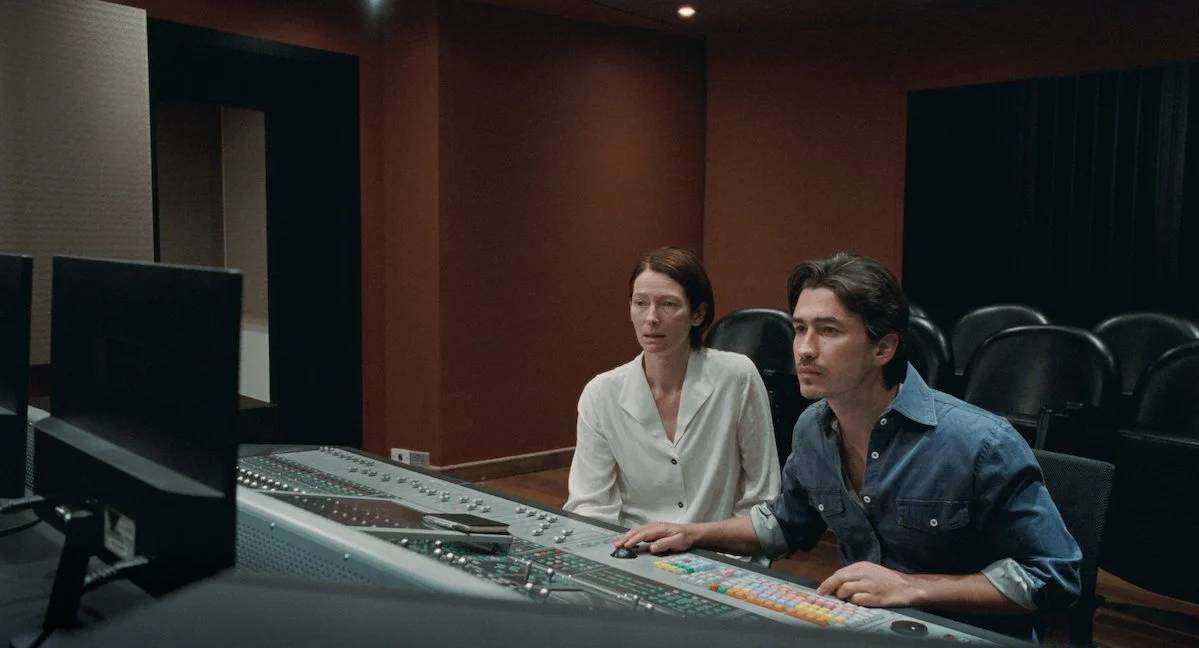Sonic Malady
Man, oh man, does Apitchatpong Weerasethakul ever go above and beyond in his latest exercise in hypnotic filmmaking. Bravo, Joe.
Memoria
Director: Apichatpong Weerasethakul • Writer: Apichatpong Weerasethakul
Starring: Tilda Swinton, Elkin Díaz, Jeanne Balibar, Daniel Giménez Cacho, Agnes Brekke, Jerónimo Barón, Constanza Gutiérrez
Thailand / Colombia / Everyone • 2hrs 16mins
Opens Hong Kong August 24 • I
Grade: B
Not to make light of anything or anybody, but Memoria Apichatpong Weerasethakuls harder than Apichatpong Weerasethakul has ever Apichatpong Weerasethakuled before. The Thai director, often called Joe, is one of few filmmakers working these days whose films you can identify by just looking at them. “Weerasethakul-esque” is no joke. He won the Palme d’Or for Uncle Boonmee Who Can Recall His Past Lives in 2010 but he was a fixture on the Asian arthouse circuit long before that for Blissfully Yours, Tropical Malady and (my personal favourite) The Adventure of Iron Pussy, about a drag queen secret agent. His work ties together so tightly because Weerasethakul has gone back to the same well again and again and again: dreams versus reality, reincarnation, nature, queerness and sexuality. He is, and has always been, aggressively artistic – his short film credits and museum installations are off the charts – marching to the beat of his own drum. His contribution to The Year of the Everlasting Storm, a COVID trauma anthology, was “Night Colonies” – about the insects that gather around lights. Not a face mask to be seen and you know what? Fuck, yeah. Keep on keepin’ on. Also? He is not Pen-Ek Ratanaruang.
All that said, even by Weerasethakul standards Memoria is tough going. After premiering at Cannes (where else?) in 2021, the film’s been trickling out in bits and bobs, and it’s easy to see why. A lyrical fantasy-mystery with dramatic undercurrents about memory and trauma, Memoria is a tough sell too, even with Tilda Swinton starring. Then again, that may add to the trickiness of the film. If that makes it sound bad, well, it’s not. It’s just challenging – something the vast majority of films at the cineplex have not been lately.
Weerasethakul plops us down in the middle of what turns out to be Medellín in the middle of the night, where we get to watch Jessica Holland (Swinton) sleeping. The protracted peace of her slumber is interrupted by a loud thud, maybe a boom of sorts, that is creepy on its own merit. She gets up, starts puttering around in the dark, but can’t figure out where it came from. A few minutes later, the obnoxious alarms of every car in a nearby parking lot go off. Are the two events connected? Who knows. Jessica visits her sister Karen (Agnes Brekke) in hospital in Bogotá, and crashes with Karen’s husband Juan (Daniel Giménez Cacho), and their son Mateo (Jerónimo Barón). Her curiosity getting the better of her, she visits a sound engineer, Hernán (Juan Pablo Urrego), and works with him to recreate the mysterious sound – because she keeps hearing it. They strike up a friendship and he offers to take her out to the country.
Now, if that makes it seems as if Memoria has a plot, that’s misleading. It doesn’t really. Memoria is a series of loosely connected vignettes and moments in Jessica’s life. She learns about bones being excavated in a tunnel from a medical anthropologist (Jeanne Balibar). She’s stalked by a stray dog. She watches a jazz band jam. When she returns to the studio to pick up Hernán for their trip, he’s gone, and no one there has any idea who she’s talking about. She heads out of town on her own and runs into a dude isolating himself on his farm. He’s Hernán, but well into middle age (Elkin Díaz). Or maybe he’s another Hernán.
The best way to consume Memoria – and that is indeed what you do – is by immersing yourself in it (sound designer Akritchalerm Kalayanamitr’s work deserves a good screen with great surround sound) and letting its mesmerising rhythms and niggling mysteries get under your skin. This is an experiment in sound and memory, obsession and discovery, alienation, and in many ways spiritual searching but it utterly defies being categorised. Film nerds would call it one of the most purely cinematic films of the last decade, and they’d be right. It helps that Swinton so effortlessly navigates Jessica through Colombia (this is Weerasethakul’s first English-language film), keeping the details on the periphery without distracting by demanding answers. We find out she’s a botanist at one point, but yeah. Whatever. Whether or not the two Hernáns are the same is beside the point.
Then, while Jessica spends some time with the second Hernán contemplating death and personals histories … The Moment happens and all bets are off. Weerasethakul throws caution to the wind and goes down a road viewers are either going to go with him willingly – or sit with a slack-jawed “WTF?” on the tip of the tongue. It’s a choice that’s every bit as mesmerising as the rest of the film and must be experienced to be believed. If you let it, Memoria will wash over you like a warm wave, but whatever your final take, you won’t forget it. And man. That “moment”. Once again: keep on keepin’ on, Joe. — DEK



